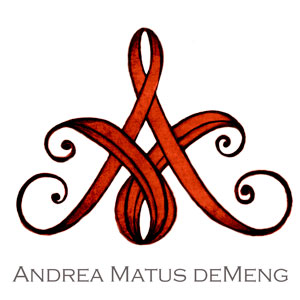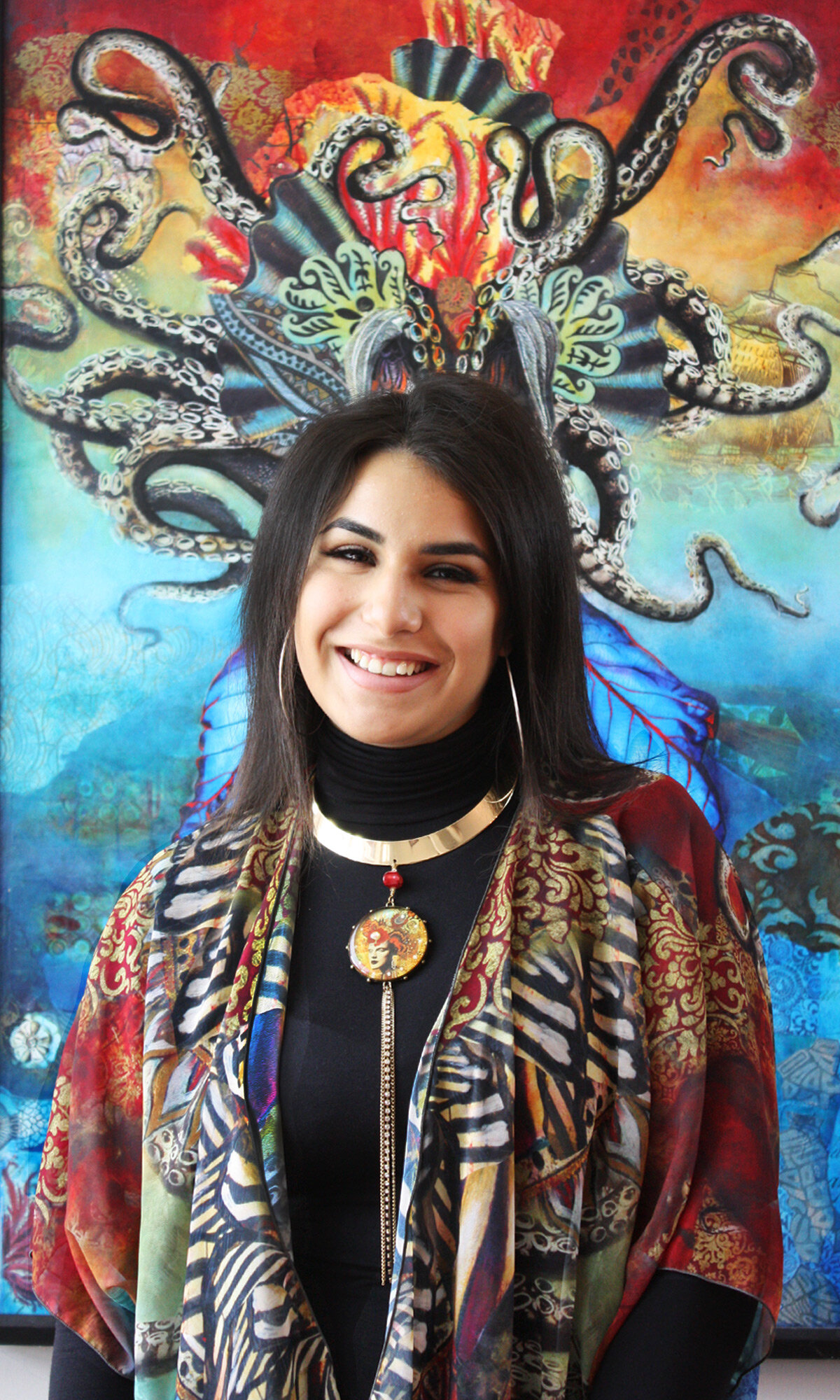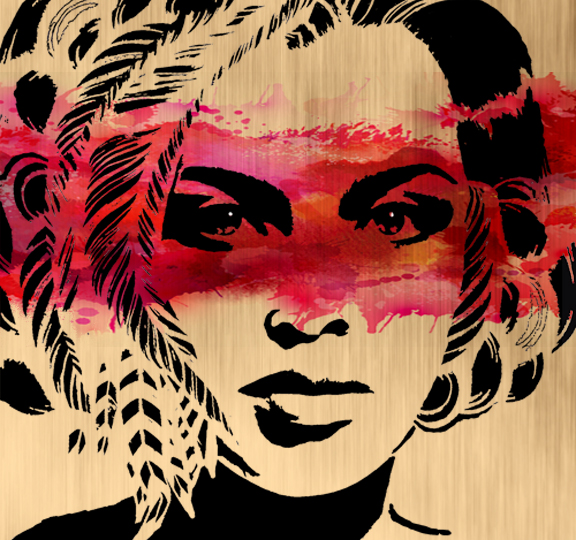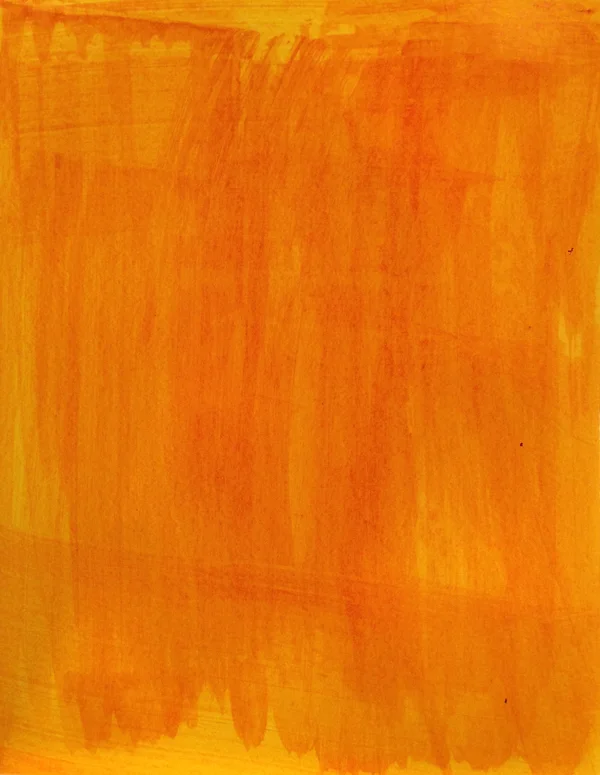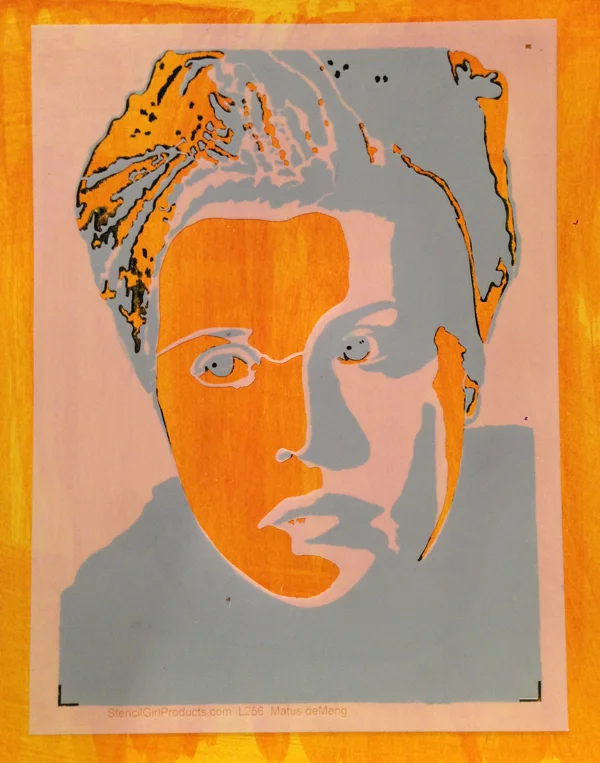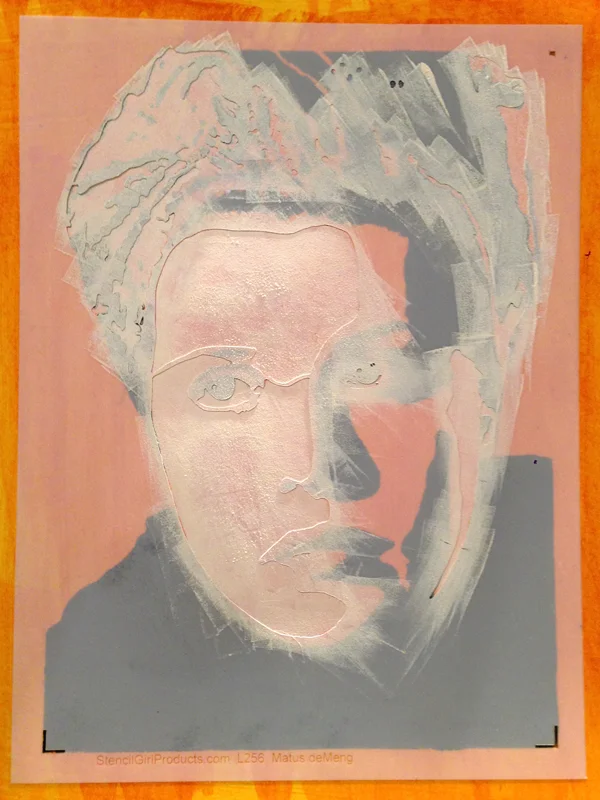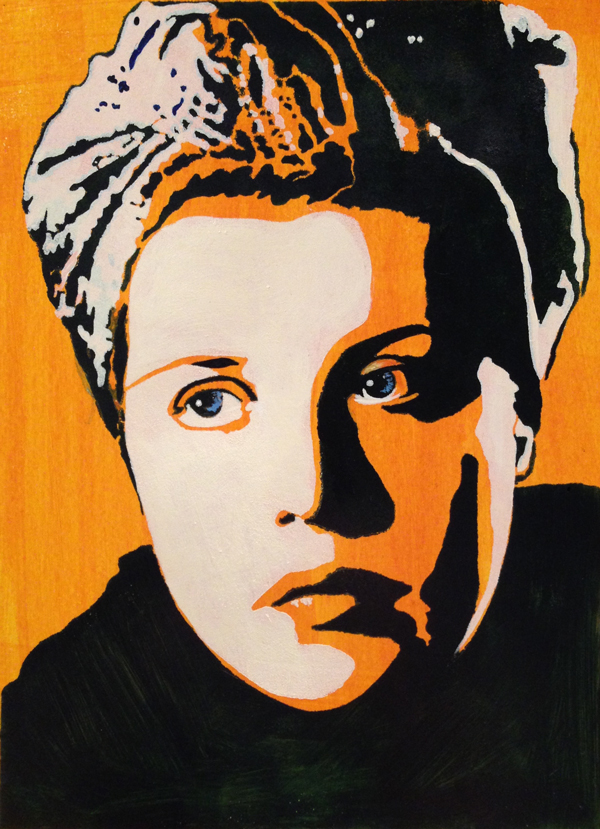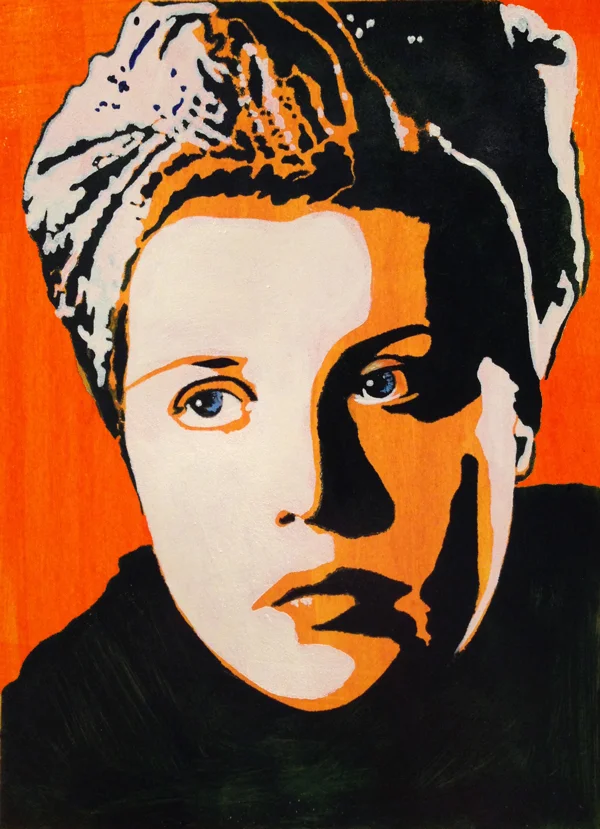Stencil Inspiration - A quick tutorial for gorgeous miniature art journals to keep or gift!
I have little notebooks everywhere. All of my purses, bedside table, in the car…I love them and always want to be ready when inspiration strikes or a to do list needs to be written down. Yeah, I know, I’m kind of old-fashioned that way, but I love a list!
Here’s a quick look at couple of ways that I have used my latest stencils to make a few journals.
These started out as small kraft paper blank journals from Moleskine, I like these for the paper quality and size but any little notebook will do. The paints and gel medium I used are from GOLDEN Artist Colours.
Start by painting your journal covers - I kept these plain and used Cobalt Violet for one, and Quinacridone Magenta mixed with Fluorescent Pink for the other.
After the covers were dry, I mixed some heavy matte gel with the same paint colours I used for the covers.
Position your stencil (Pretty as a Peacock Mini) on your cover and using a palette knife apply a thick-ish layer of the paint/gel combo over your stencil, kind of like icing a cake. It’s pretty obvious I think, but I used the fuchsia paint mix on the violet background and the violet paint mix on the fuchsia background.
Lift the stencil up without sliding and you should have a brilliantly clear raised impression of the stencil on your journal cover.
CLEAN your stencil! When you are using any of the heavy gels or pastes with your stencils it’s important to clean them off right away.
Wait, and let the cover dry. Because we added the heavy gel and applied a thick layer it’s going to take a lot longer to dry than before. Ideally leave it alone for a few hours.
Once completely dry, I just added a little bit of washi tape at the top and bottom of the stencil to add a little more flourish.
You’ll see the same technique shown here but with a different colour palette and on a mini hardcover journal I picked up at my local art store.
Last one with this same stencil. Here a plain white background is used, the stencil is painted with GOLDEN copper mixed with their Coarse Pumice Gel instead of the Heavy Matte Gel. After it’s dried some golden paint is applied with a paintbrush and a black Micron pen to further bring out some of the details.
I have four mini face stencils and any of them would work great with this technique. Have fun making your own mini journals! Here’s the link to StencilGirl if you want to check them out :)
Using Stencils to Create Fabulous Portraits - Tutorial
Place your stencil on your page, make sure you leave plenty of room around it to add more details later. (I am using the Mystique Stencil here).
Now grab your pencil and start filling in the stencil. As you can see in the photo I'm not being too fussy about it....you can take more time with this if you wish, but you really don't need to.
Now take your blending stump and start blending. This will smooth out the pencil marks quite quickly.
Remove the stencil and this is more or less what you'll see on your page.
Now go back into your drawing with your pencil, you are going to fill in the missing bits of the gace. The line and shading breaks that you see in the lips and eyes....fill them in. This is an important step to transform the look of the work from an obvious stencil to more of an actual drawing.
Once you are done filling in the line breaks it's time to add a little more emphasis. Here I have gone over the eye lid with my pencil to darken the line as well as add the pupil to the eye.
Time to go back into the drawing with your blending stump. Soften the lines by blending into the lips, smoothing the eyelids and brow line and here's a BIG secret (so shhhhh, don't tell anyone)...by now your blending stump is covered in graphite dust...you can use it to add subtle shading wherever you want. Here I've gone in with just the blending stump to add more shadows around the nose and eye lid.
Using your pencil go ahead and draw in the shape of the face, the hairline and neck. Draw lightly so that you can go back and easily erase and modify your lines until you are happy with what you've drawn.
The finishing touches...here I've gone back and repeated all the techniques we've just covered but using my A Rose by any other name, A little Birdie told me and Free as a Bird stencils to add additional details into the headdress and portrait.
Here's what the final portrait looks like.
Using Multi-Layered Stencils in your Mixed Media artwork
Quick tutorial on using multi layered stencils designed by Andrea Matus deMeng
Many of you know that I have a line of stencils with StencilGirl and one of the questions I am asked often is how to use the multi-layered stencils in the line, so without further ado let's get to a quick tutorial to show you how I use them. We are going to use the Doris Light Plate & Dark Plate Stencils for this tutorial. The slide show below gives you a quick overview of the steps, if you want all the details you'll find them below.
Step One: Gather your supplies. You'll need:
a surface (I used a sheet of coldpress watercolour paper)
4 paint colours (light, midtone, dark and contrast colour)
sponge or stencil brush
paper towel (to remove excess paint from brush)
Easy Tac or some other removable spray adhesive
your stencils
Step Two: get a little fresh air, and while you are outside spray the back of your stencils with the Easy Tack. This is my secret for getting great results with stencils that have fairly complex and small cutouts so shhhhhh don't tell anybody.
Cover your surface with the midtone colour of your paint. Easy peasy.
Place your Dark Plate stencil on your surface, you'll want to pat it down with your hands to make sure it is fully stuck down. It's probably pretty obvious from the name, but just in case...this one will use your dark coloured paint. Notice the small cutouts in the top right hand corner and the bottom left and right hand side, these are registration marks, colour them in with a pencil to ensure that the next layer lines up perfectly.
Now taking your paint or stipple brush and using a "pouncing" motion apply the paint. Less is more here. You are better off doing a couple of coats of paint than to be heavy handed. Too much paint on your sponge or brush means that paint will seep through and create a pretty messy effect. StencilGirl has loads of videos demonstrating proper technique here if you are having trouble.
Now you are ready to add the light plate. Remember the registration marks when you place the second stencil. Now repeat the previous steps using your lightest colour paint.
A little fine-tuning. Painted in some details in the eyes and joined some of the stencil breaks with paint.
Add some paint to the background to really make the image pop. I used Pyrrole Red from Golden.
If you want to try it out yourself, or to see the other stencil combinations, you can find my stencils at StencilGirl, right here! A whole new batch of face stencils will be coming out very soon....stay tuned. ..
Product Links:
StencilGirl Doris, Dark Plate
StencilGirl Doris, Light Plate
Golden Paint (Indian Yellow Hue, Pyrrole Red, Anthraquinone Blue)
Kroma Artist Acrylics (Titanium White)
Pam Carriker Sheer Acrylics by Matisse (Mustard Seed)
A Rose by any other name - altered journal tutorial
Rose Book Tutorial using stencils.
Here's a little tutorial for you for a little journal I made using my "A Rose by any other name" Stencil (available at StencilGirl Products)
I know you're going to want to know where some of these goodies came from:
•the metal filigree on the left hand side was made using the Petite Monarch diecut and metal foil from Spellbinders
•the swirly rhinestones came from Prima Marketing, it was something I had picked up years ago and just lay in wait for the right time to be used - so I can't tell you if they still carry that product or not.
•the tattered fabric was just a piece of cheesecloth from the grocery store that I separated and tea stained. It was glued into the inside cover, which was then covered over with more decorative papers.
•the semi-translucent leaves I made by creating a resin paper from one of my favourite handmade papers, then cut it into leaf shapes and glued it under the rose. There's a tutorial for how to make resin papers from Susan Lenart Kazmer here
•the added accent on the rose that creates an almost enamelled look to the edges was created by using a bit of Glossy Accents by Ranger (dries clear but maintains some dimension)
Geek Speak Alert!
Styrene is also known as ethenylbenzene, vinyl benzene and phenylethene. Approximately 25 million tons (55 billion pounds) of styrene were produced in 2010. I have no idea how many roses you could make with 55 billion pounds of styrene. E6000 will "melt" polystyrene....this tends not to be a good thing.
Thanks for stopping by......I think I'll leave you with a song...




